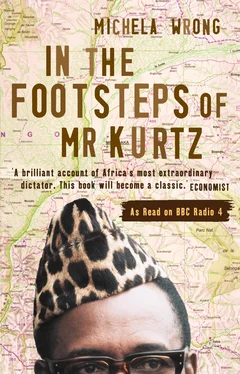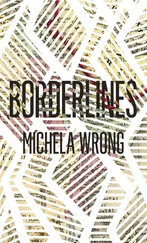By the river’s edge lay what remained of Kongulu’s sports car. Abandoned when he boarded a speed boat, it had already been stripped by looters of tyres, seats and spare parts. Along the same waterfront, Prime Minister Likulia Bolongo had also made his escape, ushered by French commandos onto a helicopter. Driving past the Hotel Memling, we noticed a dozen camera tripods laid out in a surreally neat row. The Japanese journalists, it seemed, had decided that the rebels would oblige them with a historic photo opportunity by marching down Kinshasa’s main boulevard. In fact they were being a little more unpredictable, fanning through the surrounding districts. We finally stumbled upon them near the sports stadium: a group of quiet, disciplined Tutsi youths allowing themselves to be appraised by a curious crowd while they rested near a shot-out BMW. Its DSP passengers had abandoned their uniforms, but the strategy had not saved them. Riddled with bullets, they lay face-down in pools of blood.
Back at the Intercontinental, the Belgian sun-worshipper was already in her bikini, catching up on missed rays. But the hotel’s official liberation did not come until the following day. Leaving the breakfast table, I had gone to see whether our taxi drivers had returned to their normal spot under the trees. And suddenly, there the rebels were. In flip-flops and bare feet, most of them no more than boys, staggering under the weight of shells and pieces of equipment, the column of AFDL fighters stretched as far as the eye could see down the Avenue des Trois Z.
Housewives ran in their dressing gowns across the lawns, brandishing cartons of Kellogg’s Cornflakes and Cocopops as placatory offerings. But the adult commanders kept chivvying the exhausted ‘kadogos’ (little ones) along, afraid they would fall asleep as soon as they stopped moving. ‘You must be tired,’ sympathised an onlooker. ‘Yes. I’ve walked all the way from Kampala,’ replied one boy, artlessly spilling the beans on Uganda’s involvement in the rebel uprising. ‘Sshhh,’ remonstrated his superior.
Abandoning their coffees, the hotel guests emerged to watch. There was a smattering of excited applause as the khaki procession wove its weary way up the hill to Binza, home of the mouvanciers and the site of Camp Tsha Tshi, Mobutu’s last bolt-hole. From start to finish, the capture of a city of five million people, climax of the rebel campaign, had taken less than twenty-four hours. For the first time in history, a group of African nations had banded together to rid the region of a despot. The event was hailed as the start of an African Renaissance, spearheaded by a ‘new breed’ of African leader.
Over the next few days, Kinshasa made the changes appropriate to its new role as capital of the rebaptised Democratic Republic of Congo. The word ‘Zaire’ was removed from public buildings and road signs, leopard statues were blown up and the national flag – the flaming torch of the Mobutu era – painted over with the AFDL’s blue and yellow. To jog rusty memories, newspapers printed the words to ‘Debout Congolais’ (‘Congolese Arise’), the post-independence anthem being revived by Laurent Kabila, who traced his political lineage back to Patrice Lumumba, the country’s first prime minister.
With ironic inevitability, the rebel leader who had promised to retire from the fray once Mobutu was toppled declared himself president and moved his administration into the Hotel Intercontinental. One day there was a peremptory knock at the door while I was in the shower. Looking through the spy hole I finally saw my nightmare vision made flesh: two twitchy young soldiers, rifles at the ready. But it was only the AFDL, checking for weapons, not a DSP unit intent on my defenestration.
In the hotel corridors, where the shops swiftly removed their ‘sale’ signs and jacked their prices back up, a new generation of lobbyists milled in search of advancement. The Atrium echoed with English and Swahili, instead of French and Lingala, and in the restaurants ragged AFDL fighters replaced the sinister DSP. But they shared their predecessors’ habit of never paying. The manager’s face grew taut once more. He was not amused when one of the rebels caused a bit of a ruckus at breakfast one day, carelessly dropping a grenade which rolled under the selection of almond croissants and pains au chocolat.
In theory, the AFDL was now in charge of one of Africa’s richest states, a country blessed with diamonds and gold, copper and uranium, oil and timber. In practice, it had inherited a country reverting to the Iron Age society first encountered by the Portuguese explorers of the fifteenth century. The infrastructure was shattered, the army hopelessly divided. The state boasted more than half a million civil servants, who did little but wanted compensation for months of salary arrears. Foreign debts had accrued to the tune of $14 billion; the country had disastrous relations with all international institutions of importance and, worst of all, a population cynically inured to breaking the law.
With a simplistic rigour that could only be explained by the decades its cadres had spent outside the country, the AFDL set about the task of moral spring-cleaning. There were to be no Liberia-style executions. Instead, the new government declared the independence of the central bank, the institution Mobutu had treated as his personal cash reserve, and sacked the heads of the state enterprises Mobutu had milked for revenue. They went to join the former ministers and presidential business associates awaiting trial in Kinshasa’s infamous Makala jail, specially repainted for its VIP intake.
Top of the investigators’ list, of course, was Mobutu himself. The rebels had started legal proceedings well before reaching Kinshasa, firing off requests for the president’s assets to be frozen in a dozen European and African countries while still on the move. Claiming he had evidence that Mobutu had appropriated a staggering $14 billion, with $8 billion of that stored in Switzerland alone, incoming Justice Minister Celestin Lwangi pledged to reverse the flight of capital.
But as the vestiges of Mobutu’s reign were painted over and the Hotel Intercontinental, symbol of his rule, appropriated, the departed dinosaur did manage to exact his petty revenge. One of the last actions performed by the DSP families before heading out was to rid themselves of their Mobutu mementoes, stuffing MPR T-shirts and cloth printed with the president’s face down the hotel lavatories. For the first week of the new regime, the AFDL leaders had to go outside to relieve themselves. Mobutu was literally clogging up the system.
CHAPTER TWO
Plaything for a king
‘In every cordial-faced aborigine whom I meet I see a promise of assistance to me in the redemption of himself from the state of unproductiveness in which he at present lives. I look upon him with much of the same regard that an agriculturist views his strong-limbed child; he is a future recruit to the ranks of soldier-labourers. The Congo basin, could I have but enough of his class, would become a vast productive garden.’
The Congo and the founding of its free state —HENRY MORTON STANLEY
Kinshasa possesses its own version of Ozymandias. In a field bordering the river, grounds owned by the Ministry of Planning, a grey metal giant lies ignored, his face buried in the grass. The raised arm that once beckoned flagging followers on to conquer new horizons now cradles the ground in a meaningless embrace. Too big to fit inside the warehouses holding smaller statues, this is the figure of Stanley that once towered over Mount Ngaliema, a hill overlooking Kinshasa. Congo’s founder was unceremoniously dumped here in the 1970s, when Mobutu told the crowds it was time the country finally shrugged off the colonial mantle.
Читать дальше












